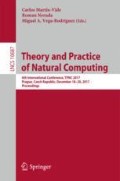Abstract
In this paper, we consider the computational power of a new variant of networks of splicing processors in which each processor as well as the data navigating throughout the network are now considered to be polarized. While the polarization of every processor is predefined (negative, neutral, positive), the polarization of data is dynamically computed by means of a valuation mapping. Consequently, the protocol of communication is naturally defined by means of this polarization. We show that networks of polarized splicing processors (NPSP) of size 2 are computationally complete, which immediately settles the question of designing computationally complete NPSPs of minimal size. We prove that NPSP of size 4 can accept all languages in NP in polynomial time. All these results can be obtained with NPSPs with valuations in the set \(\{-1,0,1\}\) as well. We finally show that Turing machines can simulate a variant of NPSPs and discuss the time complexity of these simulations.
This work was supported by a grant of the Romanian National Authority for Scientific Research and Innovation, project number POC P-37-257. Victor Mitrana has also been supported by the Alexander von Humboldt Foundation.
Access this chapter
Tax calculation will be finalised at checkout
Purchases are for personal use only
References
Csuhaj-Varjú, E., Kari, L., Păun, G.: Test tube distributed systems based on splicing. Comput. AI 15, 211–232 (1996)
Csuhaj-Varjú, E., Mitrana, V.: Evolutionary systems: A language generating device inspired by evolving communities of cells. Acta Informatica 36(11), 913–926 (2000)
Csuhaj-Varjú, E., Salomaa, A.: Networks of parallel language processors. In: Păun, G., Salomaa, A. (eds.) New Trends in Formal Languages. LNCS, vol. 1218, pp. 299–318. Springer, Heidelberg (1997). https://doi.org/10.1007/3-540-62844-4_22
Gray, R., Kotz, D., Nog, S., Rus, D., Cybenko, G.: Mobile agents: the next generation in distributed computing. In: Proceedings of the 2nd AIZU International Symposium on Parallel Algorithms/Architecture Synthesis, PAS 1997, pp. 8–24. IEEE Computer Society (1997)
Head, T.: Formal language theory and dna: An analysis of the generative capacity of specific recombinant behaviors. Bull. Math. Biol. 49, 737–759 (1987)
Hopcroft, J.E., Ullman, J.D.: Introduction to Automata Theory. Addison Wesley, Languages and Computation (1979)
Loos, R., Manea, F., Mitrana, V.: On small, reduced, and fast universal accepting networks of splicing processors. Theoret. Comput. Sci. 410, 406–416 (2009)
Manea, F., Martín-Vide, C., Mitrana, V.: Accepting networks of splicing processors: Complexity results. Theoret. Comput. Sci. 371, 72–82 (2007)
Margenstern, M., Rogozhin, Y.: Time-varying distributed h systems of degree 1 generate all recursively enumerable languages. In: Words, Semigroups, and Transductions, pp. 329–340. World Scientific (2001)
Martín-Vide, C., Pazos, J., Păun, G., Rodríguez-Patón, A.: A new class of symbolic abstract neural nets: tissue P systems. In: Ibarra, O.H., Zhang, L. (eds.) COCOON 2002. LNCS, vol. 2387, pp. 290–299. Springer, Heidelberg (2002). https://doi.org/10.1007/3-540-45655-4_32
Morrison, J.P.: Flow-Based Programming: A New Approach to Application Development. J.P. Enterprises Ltd. (2010)
Papadimitriou, C.H.: Computational Complexity. Addison-Wesley, Reading (1994)
Păun, A.: On time-varying H systems. Bull. EATCS 67, 157–164 (1999)
Păun, G.: Regular extended H systems are computationally universal. J. Automata Lang. Comb. 1, 27–36 (1996)
Păun, G.: DNA computing: distributed splicing systems. In: Mycielski, J., Rozenberg, G., Salomaa, A. (eds.) Structures in Logic and Computer Science. LNCS, vol. 1261, pp. 353–370. Springer, Heidelberg (1997). https://doi.org/10.1007/3-540-63246-8_22
Păun, G.: Distributed architectures in DNA computing based on splicing: limiting the size of components. In: Unconventional Models of Computation, pp. 323–335. Springer (1998)
Author information
Authors and Affiliations
Corresponding author
Editor information
Editors and Affiliations
Rights and permissions
Copyright information
© 2017 Springer International Publishing AG
About this paper
Cite this paper
Bordihn, H., Mitrana, V., Păun, A., Păun, M. (2017). Networks of Polarized Splicing Processors. In: Martín-Vide, C., Neruda, R., Vega-Rodríguez, M. (eds) Theory and Practice of Natural Computing. TPNC 2017. Lecture Notes in Computer Science(), vol 10687. Springer, Cham. https://doi.org/10.1007/978-3-319-71069-3_13
Download citation
DOI: https://doi.org/10.1007/978-3-319-71069-3_13
Published:
Publisher Name: Springer, Cham
Print ISBN: 978-3-319-71068-6
Online ISBN: 978-3-319-71069-3
eBook Packages: Computer ScienceComputer Science (R0)

